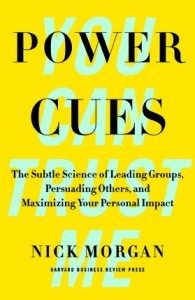When I heard about the book Give Your Speech, Change the World many years ago the author, Dr. Nick Morgan, had me at "change the world."
I read it, made lots of notes, and refer to them often. But the most important thing I learned wasn't what to put on a slide -- or whether to use them at all. It was Nick's insistence the only reason to do anything is to change the world.
I saw how often that's motivation for what I do. Everything, from writing books myself to hosting a talk show to even experimenting with my diet, goes deeper. I want to inspire other people, to show them they aren't alone -- and to offer solutions they maybe haven't considered.
 I've gotten to know Nick on the show, and when I found out he'd written a book about body language -- Power Cues: The Subtle Science of Leading Groups, Persuading Others, and Maximizing Your Personal Impact -- I was eager to talk with him about it.
I've gotten to know Nick on the show, and when I found out he'd written a book about body language -- Power Cues: The Subtle Science of Leading Groups, Persuading Others, and Maximizing Your Personal Impact -- I was eager to talk with him about it.
That's because I have a sneaking suspicion when I'm called on to account for my life, the person running the subtotal is going to have a question for me: "Why didn't you listen to your dad and have better posture?"
I don't want to field that question. I'd rather it be something like, "Why did you give your millions to this charity and not that one?"
Posture? Really? Wasn't that easy to fix?
Apparently not. It's baked in, as Nick might say, from our first years of life. How we show up in the world is, to begin with, largely a reflection of what we see from the crib or the dining room table or even the play area in kindergarten.
Nick says most body language is subconscious. Your logical brain would like to think it's in control, but more likely it's the tail wagging the dog. The example we talked about was getting a drink when we're thirsty. Chances are we reach for the glass of water before our conscious brain says, "I'm thirsty." When in fact the exchange goes something like, "I'm reaching for the water bottle." And then, "Oh. I must be thirsty."
That played out while writing this post. A song I love came up in rotation, and I sat up straight. "Why did I sit up straight just now?" I wondered, because there's nothing too trivial for me to dissect. And then, "Oh, yes. I love this song!"
If you aren't aware of your body language, how do you fix it? Nick suggests you sharpen your awareness. He videotapes clients to show them their gestures don't support their words. I need only catch a glimpse of my reflection in a mirror at the mall to remember how I feel about a program we recorded an hour earlier. You might consider watching how people react to you.
It's like what they say about the Universe. It's a mirror. It only reflects.
My husband recently noticed I'd taken a break -- if only for a few minutes -- from my default slouch. I was talking with him about my latest project, and I was standing up straight. I presented myself with not only confidence but with the full force of my convictions. He remarked on that. He found it...remarkable.
We both took it as a sign what I was talking about is worth doing. I find it interesting my body knew it before my brain had the chance to register it.
That's why I'm eager to read Power Cues. I don't have a financial interest in Nick's work -- but I have a karmic interest in suggesting you consider reading it, too.
What if all of us felt good about our lives, our jobs, our right to take up space on the planet? What if we practiced moving through our days as if we did? What if the people around us responded to those good feelings with more of their own?
I bet we'd change the world.
